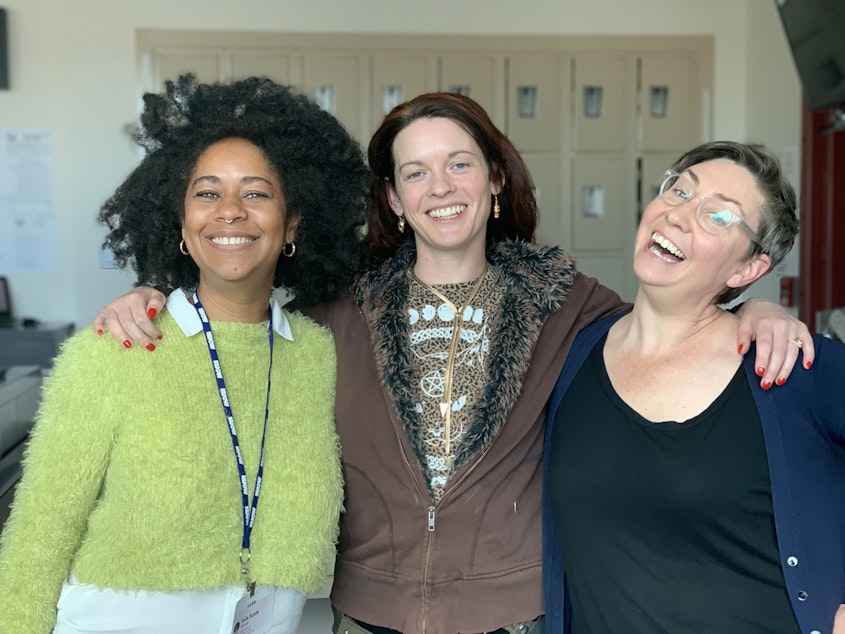From 'fierce femme' to Eminem. Savannah Sly explores gender performance in the workplace

In this episode of Battle Tactics for Your Sexist Workplace, we talk to Savannah Sly, sex worker and political activist.
When Sly worked as the Director of Sales at a cannabis startup, they did an experiment to see how clothing impacted workplace interactions.
This episode focuses on clothing at work. But it isn't “What Not to Wear: Battle Tactics Edition.” There are no makeover tips. We’re not going to tell you what sweater to wear or which lipstick to buy to make people stop talking over you in meetings.
Because frankly, we're frustrated that women are under so much scrutiny for what they wear to work — and sexism cannot be vanquished by a perfect power suit.
Instead, our conversation with Sly delves into what they learned from experimenting with different personas and clothing styles in the workplace.
Sly uses they/them pronouns. At the job where they did the experiment — a cannabis startup — Sly was the only person who didn’t present as male.
Sly said that none of the other executives took them seriously, and the clients and vendors didn’t either. So they decided to do an experiment to see how people would react to different forms of gender presentation.
Sponsored
Here are some highlights from our interview.
Jeannie: So you did an experiment with your clothing at a cannabis startup. How did that go?
Sly: I wore my first costume without thinking about it much, which is what I would normally wear if I wanted to look powerful, confident, like I know what I’m doing, and slightly feminine.
That was a tunic-y dress thing with a blazer and a cool cardigan over it, accent necklace, and a little bit of eye shadow, a little bit of concealer.
And then always knee-high black boots. Riding boots. And that feels like, “Okay, I’m here, I know what’s going on, I’m on the cutting edge, and I’m serious about what I’m doing.”
Sponsored
Eula: I can picture this woman. She shops at tbd at Nordstrom. You know Nordstrom? There’s like one department that’s young, and there’s one that’s on the way to being a grownup, and there’s the grown up with the job, and the mom on the weekend. And you’re in the department of “mom with a job.”
Sly: You just described all these subtle different gender personas. There are so many different flavors of “women who work.” It has to do with your age, what you do on the weekends, whether you’re single or married, whether you have kids or not. There are all these different cultural indicators that are very subtle.
And what other personas did you try?
So then I went in the opposite direction, a little closer to how I generally look when I’m at home, which is pretty gender neutral.
I like to fancy that when I put on a beanie cap and a big black sweatshirt, I look like Eminem.
Sponsored
I’m not a huge Eminem fan, but I’m comfortable. I’m not super masculine, I’m not feminine. I’m just here, I’m smart, I’m paying attention. I’ve got friends, I can hang. I gotta go watch a baseball game. I gotta crawl through this culvert. I gotta move some boxes.
My whole thing was, “I’m going to be your little brother. You want me in. Let me be your henchman. Let me work with you guys. Give me the tools I need to get this job done.” Because I was not getting the tools I needed. They were not working with me.
Jeannie: And did it work?
Sly: It worked. It got me more places.
In the cannabis world, when you’re actually interfacing with bud tenders and the public, being an everyday person gets you the furthest. At its core, it’s a pretty unpretentious business.
Sponsored
Jeannie: What did you learn from that experiment, specifically about clothing?
Sly: I think a lot about the idea of persona. We all have a litany of personas within us. And if we get conscious about them, we can choose to show different sides of ourselves to people.
And so all of those different little gender experiments that I did, those are all real parts of me. And wearing those different outfits brings out different parts of me. They change my body language.
It’s all real — it is all me — it was just crafted for the situation. And I was trying to figure out what the best parts of me were for the job.
Eula: This is so valuable. I keep thinking about how much I’ve thought of these things going into every interview and job I’ve ever had, and how little I was aware of it. But how sure I am that I was trying to present myself as smart, intelligent, likable.
Sponsored
Jeannie: And I have to say, in the past when I have done that, it has made me incredibly nervous and uncomfortable. But it’s because I never thought about it as an extension of myself.
Sly: It's an extension of you. We do these things subconsciously. If we just bring a little more mindfulness to it — when we’re at home getting ready for a job interview, which is so stressful.
Before you go in, think, What archetype am I? Am I going to be your new dominant manager who’s going to kick ass around here? Or am I going to be part of your team? Or am I that mysterious person with all of the ideas?
Think about that beforehand and just imbue yourself with it. And don’t hang your brain up on thinking of it as some equation. It’s part of you.
Prepared for the web by Christy Scheuer.



